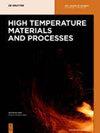Al–Si–Fe alloy-based phase change material for high-temperature thermal energy storage
IF 1.5
4区 材料科学
Q4 MATERIALS SCIENCE, MULTIDISCIPLINARY
引用次数: 0
Abstract
Abstract Carnot batteries, a type of power-to-heat-to-power energy storage, are in high demand as they can provide a stable supply of renewable energy. Latent heat storage (LHS) using alloy-based phase change materials (PCMs), which have high heat storage density and thermal conductivity, is a promising method. However, LHS requires the development of a PCM with a melting point suitable for its application. For the Carnot battery, the reuse of a conventional ultra-supercritical coal-fired power plant with a maximum operating temperature of approximately 650°C is considered. Therefore, developing a 600°C-class alloy-based PCM is crucial for realizing a highly efficient and environmentally friendly Carnot battery. Using thermodynamic calculation software (FactSage), we found that Al-5.9 mass% Si-1.6 mass% Fe undergoes a phase transformation at 576–619°C, a potential 600°C-class PCM. In this study, we investigated the practicality of an Al–Si–Fe PCM as an LHS material based on its heat storage and release properties and form stability. The examined Al–Si–Fe PCM melted until approximately 620°C with a latent heat capacity of 375–394 J·g−1. Furthermore, the PCM was found to have a thermal conductivity of approximately 160 W·m−1·K−1 in the temperature range of 100–500°C, which is significantly better than that of conventional sensible heat storage materials in terms of heat storage capacity and thermal conductivity.用于高温储能的Al–Si–Fe合金基相变材料
摘要卡诺电池是一种从电能到热能的储能方式,由于能够提供稳定的可再生能源供应,因此需求量很大。合金基相变材料具有较高的储热密度和导热性,是一种很有前途的储热方法。然而,LHS需要开发一种熔点适合其应用的PCM。对于卡诺电池,考虑重新使用最高运行温度约为650°C的传统超超临界燃煤发电厂。因此,开发600°C级合金基PCM对于实现高效环保的卡诺电池至关重要。使用热力学计算软件(FactSage),我们发现Al-5.9质量%Si-1.6质量%Fe在576–619°C下发生相变,潜在的600°C级PCM。在本研究中,我们基于Al–Si–Fe PCM的储热和放热性能以及形状稳定性,研究了其作为LHS材料的实用性。检查的Al–Si–Fe PCM熔化至约620°C,潜热容量为375–394 J·g−1。此外,发现PCM的热导率约为160 W·m−1·K−1,在100–500°C的温度范围内,在储热能力和导热性方面明显优于传统显热储热材料。
本文章由计算机程序翻译,如有差异,请以英文原文为准。
求助全文
约1分钟内获得全文
求助全文
来源期刊

High Temperature Materials and Processes
工程技术-材料科学:综合
CiteScore
2.50
自引率
0.00%
发文量
42
审稿时长
3.9 months
期刊介绍:
High Temperature Materials and Processes offers an international publication forum for new ideas, insights and results related to high-temperature materials and processes in science and technology. The journal publishes original research papers and short communications addressing topics at the forefront of high-temperature materials research including processing of various materials at high temperatures. Occasionally, reviews of a specific topic are included. The journal also publishes special issues featuring ongoing research programs as well as symposia of high-temperature materials and processes, and other related research activities.
Emphasis is placed on the multi-disciplinary nature of high-temperature materials and processes for various materials in a variety of states. Such a nature of the journal will help readers who wish to become acquainted with related subjects by obtaining information of various aspects of high-temperature materials research. The increasing spread of information on these subjects will also help to shed light on relevant topics of high-temperature materials and processes outside of readers’ own core specialties.
 求助内容:
求助内容: 应助结果提醒方式:
应助结果提醒方式:


